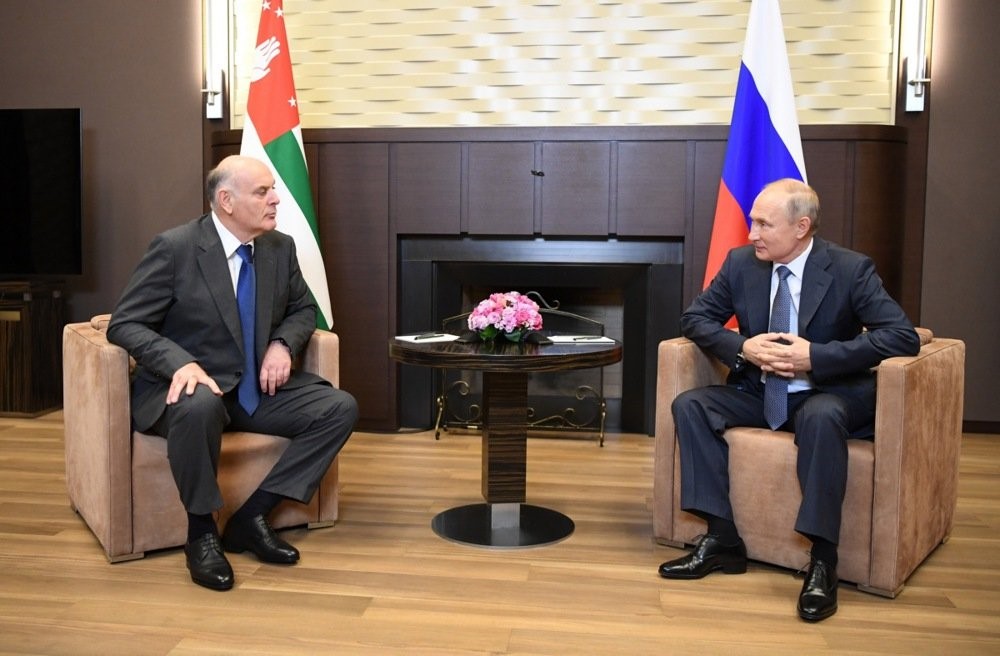Russia fails to subdue Abkhazia
Yet another hospitalization for a president of the Caucasian republic during a visit to the Kremlin. Over the past three years Moscow has proposed several "harmonization plans" of laws and political-economic systems to Sukhumi. The Abkhazians have so far put on a good face, partly in order not to lose the funding allocated by the Russian government, but always maintaining a certain distance and autonomy.
Sukhumi (AsiaNews) - The president of the Caucasian independence republic of Abkhazia, Aslan Bžanja, has emerged from the hospital where he had been hospitalized during a visit to Moscow to mark 15 years since Russia recognized the republic's "independence."
Some malicious people had spoken of poisoning, an increasingly frequent and varied practice by Russian intelligence services; after all, it was not the first time Bžanja had ended up in the clinic after meeting with Russian President Vladimir Putin.
The problem is that although Abkhazia has always maintained that it considers Russia "a neighboring state with blood ties," yet it has also always dismissed the idea of joining the Russian Federation, or one of the many "Unitary State" projects proposed by the Kremlin for its former Soviet subjects, from Georgia to Kazakhstan to Belarus and now Ukraine.
In the context of the "special military operation" whose end cannot be seen, the pride of the small Georgian region arouses Putin's decided resentment.
The two republics that remained under Moscow's control after the 2008-2011 war, Abkhazia and South Ossetia, still sent a couple of thousand volunteers to Russia's war in Ukraine, though most soon returned home dead.
Ossetians in particular were horrified by the load of dead returned from the front: now they rest in a special field of the Tskhinvali cemetery. Even in Sukhumi, the capital of Abkhazia, the bodies of 800 soldiers were buried, slightly less than its cousins in Ossetia, whose population is a tenth of that of Abkhazia.
After this first unfortunate expedition, it was declared by both republics that no more men will go to Ukraine: "have you ever seen Georgia try to reconquer us", as Bzhanja himself repeatedly repeated. And in general, Moscow's demands are no longer being listened to in these parts, especially on the part of the Abkhazians.
One of Sukhumi's first leaders, in 2004, was Moscow loyalist Raul Khadzhimba, a low-level KGB official in Soviet times, whose electoral campaign had been financed directly from Moscow complete with concerts by Russian pop stars.
One of them, Oleg Gazmanov, exultantly shouted “Hello, Adzharia!” to the crowd, confusing one republic with another, and the Abkhazians never forgot it. In place of Khadzimba was elected Sergey Bagash, who in Russia was considered "pro-Georgian", having his Georgian wife and children in Tbilisi.
In retaliation, Russia detected terrible harmful substances in local tangerines, banning their imports and depriving Abkhazia of its main market product. Bagaš then agreed to appoint Khadzimba as vice-president, and the crisis was overcome.
In 2008 the Abkhazians participated in the Russian war against Georgia, to “liberate” South Ossetia as well, and thus Russia (together with Venezuela) recognized the independence of Abkhazia. The following year Bagaš was re-elected, and began to establish contacts with Turkey, with the stated intention of "taking care of the Abkhaz diaspora".
Bagaš stepped aside a few years later due to an illness, the details of which have never been disclosed, and in 2019 Khadžimba was re-presented as a presidential candidate, which instead ended up with Aslan Bžanja, also unwelcome in the Kremlin.
Still during the electoral campaign he visited Sochi with Vladimir Putin, and had his first sudden illness with the typical symptoms of Novichok, the poison injected the following year into Aleksej Naval'nyj. The future president of Abkhazia had to be treated for about six months before recovering, but he never wanted to open an investigation, so as not to be considered "anti-Russian".
History repeated itself in March 2020, again on the occasion of a meeting in Sochi. During these episodes, Khadzhimba had obtained the presidency of the republic, but the Constitutional Court in Sukhumi annulled results, and eventually Bžanja was elected president.
In the last three years, various "harmonization plans" of laws and political-economic systems have been proposed by Moscow in Sukhumi, trying to establish the increasingly rigid rules of Putin's authoritarianism also in Abkhazia.
The Abkhazians have so far made the best of a bad situation, also in order not to lose the funding allocated by the Russian government, but always maintaining a certain distance and autonomy, punished by the Kremlin with yet another "illness of the president".
If the peasants of the Caucasus cannot be brought under control, the Russians think, it will be highly unlikely to subdue the Cossacks of the Ukraine.







.png)










